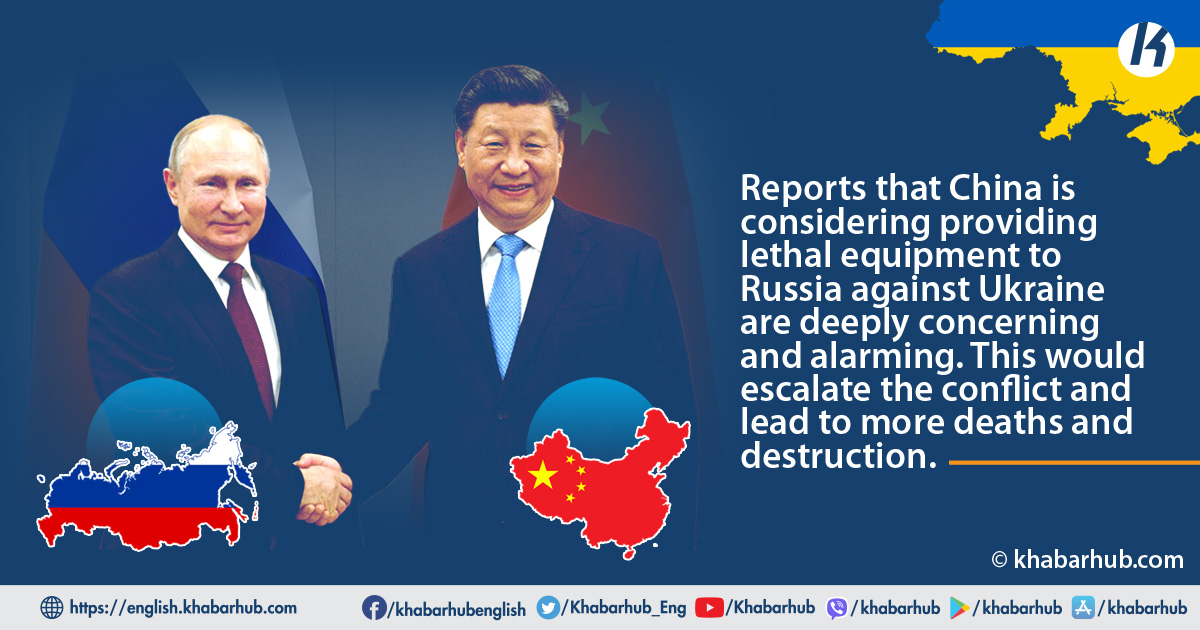Amid a preliminary US intelligence report that China is considering providing lethal arms to Russia to be used against Ukraine, the ongoing conflict in Ukraine has become more alarming, and the restoration of peace in the country is undoubtedly an objective that the international community should strive for.
China’s gesture of providing lethal aid to Russia can have serious implications, and can even escalate the conflict and lead to more deaths, and destruction and will further lead to destabilization.
Russia has committed already thousands of war crimes, and if China gets involved in the conflict, it, too, should be held responsible for the crimes since Beijing’s support to Russia militarily is a violation of international law and principles of the United Nations Charter.
If the reports of the US intelligence coming in are to be considered, China is considering providing lethal aid to Russia, and this can be unfortunate and grave.
Beijing should also understand that under the United Nations Charter, member states are required to respect the sovereignty and territorial integrity of other states and to refrain from the use of force against them.
Any military support provided by one state to another without the consent of the state being supported can be seen as a violation of these principles.
The government of Nepal’s statement, both in the national as well as international arena, should be consistent with the principles of the United Nations Charter, which emphasizes respect for the sovereignty and territorial integrity of all states, including Ukraine.
Therefore, China’s military aid to Russia will be a violation of international law.
The military aid includes ammunition and artillery causing concern not only to the United States and the region but to the entire world, including Nepal.
Most importantly, the restoration of peace in Ukraine is a must but Beijing’s supply of legal arms to Russia will further destabilize the situation.
Therefore, Nepal should join the international community to condemn China’s move.
In such a situation, China needs to consider the long-term consequences of such a move since this could lead to a dangerous precedent of countries arming their allies in regional conflicts.
Beijing’s immature decision, observers note, would only serve to increase the likelihood of future conflicts and further destabilize the international order.
For instance, even US Secretary of State Anthony Blinken and CIA Director Williams Burns have publicly warned China against providing Russia with lethal military aid.
Needless to say that the conflict in Ukraine has already claimed countless lives, and this would be more devastating if Chinese leadership provided lethal equipment or aid to Russia rather than trying to pacify the situation.
Wouldn’t this be a reckless move on the part of Beijing instead of prioritizing diplomacy and working towards finding a peaceful resolution to the conflict?
Here, it is high time that the international community worked together to de-escalate tensions and prevent any further violence in the region.
What China should understand is that providing arms by any state to countries involved in a conflict can potentially fuel the conflict and make it more difficult to achieve a peaceful resolution.
But the question is: Will China’s leadership take the initiative to de-escalate the conflict? Very few countries will believe this!
Beijing’s immature decision, observers note, would only serve to increase the likelihood of future conflicts and further destabilize the international order.
On the other hand, perhaps Beijing understands that it is equally important to note that any country’s right to engage in arms sales should not be necessarily in violation of international law.
Meanwhile, as China’s neighbor, Nepal, like all other countries, should exercise its right to express its views on international issues and take a position on them based on a careful assessment of the facts and the country’s national interests.
The government of Nepal’s statement, both in the national as well as international arena, should be consistent with the principles of the United Nations Charter, which emphasizes respect for the sovereignty and territorial integrity of all states, including Ukraine.
It is important for Nepal to have a clear and consistent foreign policy that is guided by principles of peace, stability, and respect for international law and human rights.
Since Nepal perceives China’s supply of arms to Russia as a threat to Ukraine’s sovereignty and independence, the government of Nepal has to strongly express its concerns and urge the international community to find ways to restore peace in Ukraine.
Moreover, it is also important for all countries, including Nepal, to contribute to efforts to resolve conflicts peacefully and through diplomatic means that involves expressing support for Ukraine, and advocating for dialogue and negotiation besides encouraging the use of international legal mechanisms to address the dispute.
On the other hand, it is worth mentioning that both Russia and China are permanent members of the UN Security Council, and therefore, their actions may be subject to different legal and political considerations.
These price increases can create economic challenges for countries that rely on imports and can lead to inflation, reduced economic growth, and other negative consequences at a time when the international community has called for a peaceful resolution to the conflict in Ukraine, including the withdrawal of Russian troops from the region.
It may be noted that on February 26, 2022, the UNGA adopted a non-binding resolution condemning Russia’s aggression against Ukraine and calling for a peaceful resolution to the conflict.
The resolution was adopted by a vote of 144 in favor, 11 against, and 36 abstentions.
Nepal was one of the 144 countries that voted in favor of the resolution. And Nepal’s vote reflects the country’s commitment to the principles of the United Nations Charter, which include respect for the sovereignty and territorial integrity of all states, and the peaceful resolution of disputes.
Nepal also should sent strong and clear message to the international community that it is in favor of Ukraine’s sovereignty and independence.
China arming against Ukraine is against Nepal’s foreign policy objectives, and that Nepal needs to vocally urge the international community for finding ways for restoring peace in Ukraine
In addition, if China supplies lethal weapons to Russia, it will be contributing to the conflict in Ukraine, and could also exacerbate the economic impact of the conflict by increasing the risk of sanctions and other economic measures by other countries.
What also has to be taken into consideration is that Nepal is vulnerable to economic impact resulting from global events and disruptions to supply chains.
Therefore, it is also important for the international community, including China, to work together to find solutions that promote stability, peace, and economic growth for all countries rather than aggravating the situation.
This involves measures to reduce the risk of conflicts and disruptions to global supply chains, as well as efforts to promote economic development and cooperation among countries.
If China were seen as supporting these actions, it could face similar measures and could suffer negative consequences for its economy, as well as its international reputation and relationships.
China, as a member of the international community, should play in promoting peace and stability in the region by encouraging Russia to engage in constructive dialogue and to work towards a peaceful resolution of the conflict, and avoid actions that could exacerbate tensions and contribute to conflict.
To recall, the COVID-19 pandemic has had a significant impact on economies around the world, including in China.
The measures taken by the Chinese government to contain the spread of the virus, including the so-called “Zero Covid” policy, have had negative impacts on the economy, and China’s decision to supply lethal weapons to Russia can disrupt global supply chains, can have far-reaching economic consequences that can impact countries around the world, including Nepal.
Moreover, disruptions to global supply chains can lead to price increases for consumer goods, including petroleum, as well as other essential products.
These price increases can create economic challenges for countries that rely on imports and can lead to inflation, reduced economic growth, and other negative consequences at a time when the international community has called for a peaceful resolution to the conflict in Ukraine, including the withdrawal of Russian troops from the region.
Ultimately, the goal should be to find a peaceful and sustainable solution to the conflict in Ukraine, one that respects the rights and interests of all parties involved, not aggravates the situation.
This can involve diplomatic efforts, negotiation, and the use of international legal mechanisms to address disputes. It is important for all countries, including Russia and China, to play a constructive role in promoting peace and stability in the region.
If China were seen as supporting these actions, it could face similar measures and could suffer negative consequences for its economy, as well as its international reputation and relationships.









Comment